Kaddish and My Father
What do you do when you need to say Kaddish for your father, and it brings up so much pain that there are days when you hesitate to do it? When that which should bring healing, comfort, uplift, simply becomes another dreaded situation to avoid, at which you balk? And when you finally say Kaddish, and sincere and earnest as you might hope it to be, you often forget the words, or plough through it, or stoically recite every.single. syllable. you wonder if this reluctant, fractured whole counts for your father's soul. Even though every word drags as if you're wading barefoot through a quagmire of molasses.
I never imagined that reciting Kaddish could seem like a curse.
I can now place z"l after my father's name. But is he really "of blessed memory"? As the cliché goes, "It's complicated". We had been estranged (as I have been from the rest of my family) for 20 years.
I learned of his death a week after it happened, through my ex. The ex and his wife had been away, so the phone message was a week late. My sister said that my mother wanted me to know that my father had died. Sis left her own phone number, but no other details. My sister is not a fan of mine and hell will freeze over before I call her.
I finally found a death notice online a week later. He died suddenly in Mexico, and he can't be buried till the ground thaws in the spring. He died enjoying life. But in his obituary they forgot to mention that he was a war veteran. I have not yet written my mother; I hate that my sister will read the letter.
Therapy showed me the annihilating influence of my father, his browbeating, when I was a child. I adored him then, and admired him for the longest time. But in the end there was only pain and grief and disappointment. But he is dead now, so our relationship has changed.
In Poland he was raised taunting and trashing Jews. Ironically, his uncles were partisans during WWII and rescued Jews from Treblinka. As an adolescent I would call him to task about his casual, mindless denigration of Jews. I don't think there was hatred; he just never thought about it. I guess it's quite an irony that I am a Jew, but I consider my fortune due to the merit of my great-uncles. It is also more than ironical that the life he endured as an adolescent during the war, as a displaced person, interred in a labour camp in the gulag at Arkangelsk is akin to what so many Jews suffered. He knew so much suffering and loss, and saw horrendous deaths and murders. As a child.
I did not attend his religious service which was 3000 miles away and too late. Actually, nobody asked me. I have no family to mourn with. I have no Jewish community to mourn with me, to support me, to sit shiva, and I am too far away to go to minyan every day.
So every day I say Kaddish for my father and the experience seems antithetical to its purpose. I have always thought of this most beautiful and life-affirming of prayers as the balance and steadiness and antidote for all grief. Ritual provides structure but Kaddish also provides healing over time. What I have hated so far is that saying Kaddish brings memories of my father back, and with them my deep ambivalence. Every day I am forced to think of him, if only briefly. My mourning is complicated. At the moment, Kaddish highlights that point.
On the other hand, my father now is pure neshama and there is no longer that relationship of mutual disappointment and hurt. Our relationship has changed, but surprisingly it still exists. And there is no question for me that he has passed on to another life and that certainty is not due to pure faith but a knowing.
I've been looking at photos of him and it has disturbed me that gazing upon his face through the years I am not moved. I have felt guilty, too, that somehow I cannot summon visions of great loss now. I have been mourning the loss of my father for decades, so I suppose that this is not different; I never imagined there would be reconciliation either. I guess I mourn the relationship or lack thereof more than anything.
One day, after saying Kaddish, I forced myself to peruse photos of him again, from my childhood onwards. You can keep the pain at bay, but not forever. And I found my father in the photos devoid of his image, yet totally infused with his presence. I realised the enormity that was this working class man's shelter and feeding of me, and of my first rate education. Even more so, he, like I, was obsessed with home: he built them, I'm still searching for one. In early retirement, he singlehandedly built a couple of houses, taking wood from the forest of my parents' property. He taught himself and did it all. I was so proud. They owned forest and field, garden and spring, a small farm and gallons of maple syrup. I find my father in the nature that he dwelled in. My father's presence is everywhere, in every picture without his image, in every picture where he was.
My father (and my mother) suffered so much loss and terror as children, so much trauma. They passed on that trauma to me. It is hard not to excuse him for everything, knowing the life he was cheated of, but that would be unfair- he does not totally get a pass. Still, he wanted to live the American dream, and I am so glad he got to live it to the fullest. He died on vacation, too, which I find quite fitting.
My grief is complicated by all these things- the abusive father, the father I understood and felt compassion for (even when young), the father I simply adored and was proud of and admired, the father that in the end rejected me. He was a decent human being, a man of his word, a snappy dresser, had beautiful handwriting, an operatic singing voice, was intelligent and intuitive, a quick study and very skilled with his hands, but found little of value beyond himself and his few interests, and really did not value people. We never really had conversations; all I remember is his jeering. He wasn't crazy about Jews, either. And he was damaged.
My grief brings up many losses, the reliving of primal emotions, the loss of family and possibility and the loss of potential, among other things.
I miss my father, the one I knew simply as a child . I realise that, then, his presence gave me a sense of place, a love of nature, and a hunger for home. When I look at his photos now, they do not move me; but when I see photos of the houses he built, the land he owned, the countryside and parks he strolled through and fished and swam in, then my father becomes real and he and I meet and I feel myself a part of him and he a part of me, and we, part of it all.
Baruch Dayan Emet.
Rest in peace, kochany Tato. May God spread his shelter of peace and healing over you and all who love you. You are finally Home.

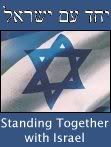



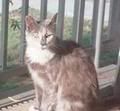 Mama
Mama
 Josh
Josh
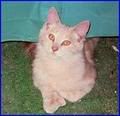
 Han
Han
 Emet
Emet
 Sammie
Sammie
 Marly
Marly
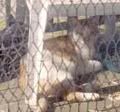 Tan Guy
Tan Guy
 Socks
Socks
 Big Daddy
Big Daddy
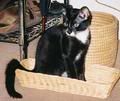 Chaplin
Chaplin
 Coffee
Coffee
 Dove
Dove

 Bosco
Bosco
 Zena
Zena
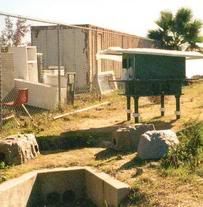

1 Comments:
Very nice post about the ambivalence towards your dad. I have similar feelings when it comes to my dad. He was incredibly abusive when I was young, to my mom and to me. I didn't speak to him for 15 years after she died. But now, I have learned to relate to him as an adult and to value the past we share together...the memories only we hold for one another. As for my biological father? May he rot in hell and I never find out.
Post a Comment
<< Home